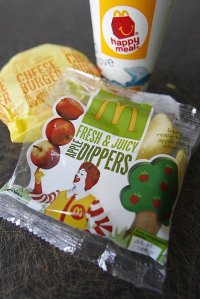Hello Everyone!
It’s been quite awhile since we have been here! Michele and I have made a pact to post regularly, now that we’re both done with the internship and passed the RD exam, so please keep us accountable.
There is really so much that can be written about right now — new Consumer Reports/FDA publications about arsenic in rice, the Stanford organic foods study, a new idea in San Francisco regarding food trucks and serving those who are homeless/without kitchen access, the large soda ban in NYC, McDonalds’ big announcement that they’re adding calorie amounts to their menus (though let’s be real: they’re going to have to do it anyway with the Affordable Care Act), and the list goes on. What are some topics you would like Michele and me to discuss in the coming weeks?
Today, I wanted to briefly share about California’s Proposition #37, the GMO Food Labeling Act / “Right to Know” Act. I know many of the readers are not in California, but the results from this November’s election will likely impact the whole country.
There’s so many ads and campaigns, so I went to the official CA voter’s guide and copied the description here:
“Requires labeling of food sold to consumers made from plants or animals with genetic material changed in specified ways. Prohibits marketing such food, or other processed food, as “natural.” Provides exemptions. Fiscal Impact: Increased annual state costs from a few hundred thousand dollars to over $1 million to regulate the labeling of genetically engineered foods. Additional, but likely not significant, governmental costs to address violations under the measure.”
A Yes vote: “Genetically engineered foods sold in California would have to be specifically labeled as being genetically engineered.”
A No vote: “Genetically engineered foods sold in California would continue not to have specific labeling requirements.”
– from the California Voter’s Guide
Companies who genetically modify their products have said that they don’t believe there are any additional health risks – but then why are they the ones opposing this bill? Also notably are the many, many Big Food companies that are opposing this bill – companies that have organic food lines. KCET has a full list of funders, but this graphic below depicts some of the big ones in an easier-to-read format:
Source: Cornucopia.org
There have been dozens of articles/op-ed pieces on this topic, including Mark Bittman and Michele Simon, so I don’t really want to just repeat what has already been said, but please take a moment to read their thoughts on this subject!
If you’re not in California, what can you do to support GMO labeling?
1. Write a note (i.e. via Facebook) to express your feelings about the company’s support/opposition to Prop 37. I wrote a sad message to Silk the other day.
2. Avoid purchasing foods made by companies who were in opposition to Prop. 37. It can be a challenge if finances/availability of other foods are an inhibitor, but it’s definitely an idea, if possible!
3. Support local farmers, as well as the organic businesses that are in favor of GMO labeling.
Have a wonderful weekend!






